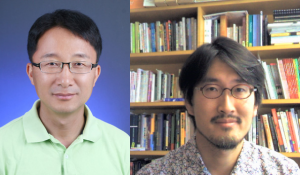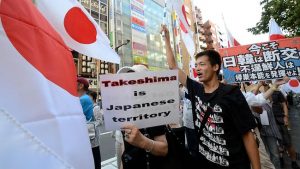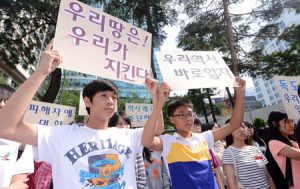Memo #184 (English and Korean translations available)
By 高山敬太(ニューイングランド大学、オーストラリア)、姜熙龍(全北大學校, 大韓民国)
 日本と韓国の間に浮かぶ小島 ―日本側呼称は竹島、韓国側呼称は獨島(トクト)― を巡る領有権争いが、二国間に緊張関係をもたらしている。もちろん、この手の問題は何も目新しいことではなく、今件のような日本の過去の植民地政策の残滓は両国間の外交問題として戦後たびたび浮上してきた。今回の緊張関係に目新しい点があるとすれば、近年日韓の距離がとりわけ文化面において急速に縮まった中で、これが生じている点であろう。交流増加の一方で、依然として二国関係が過去の暴力の記憶と内向きなナショナリズムによって規定されていることを、今回の出来事は物語っている。領土問題が外交問題化するや否や、両国の政治家たちは挙って自己の領有権を正当化することを教育現場に指示した。だが教師たちがこの方針に無批判に従うならば、二国間の相互理解と尊重を将来の世代に育むという理想は更に遠のいてしまう。
日本と韓国の間に浮かぶ小島 ―日本側呼称は竹島、韓国側呼称は獨島(トクト)― を巡る領有権争いが、二国間に緊張関係をもたらしている。もちろん、この手の問題は何も目新しいことではなく、今件のような日本の過去の植民地政策の残滓は両国間の外交問題として戦後たびたび浮上してきた。今回の緊張関係に目新しい点があるとすれば、近年日韓の距離がとりわけ文化面において急速に縮まった中で、これが生じている点であろう。交流増加の一方で、依然として二国関係が過去の暴力の記憶と内向きなナショナリズムによって規定されていることを、今回の出来事は物語っている。領土問題が外交問題化するや否や、両国の政治家たちは挙って自己の領有権を正当化することを教育現場に指示した。だが教師たちがこの方針に無批判に従うならば、二国間の相互理解と尊重を将来の世代に育むという理想は更に遠のいてしまう。
今回の領土問題は、ナショナリズムを超えた市民意識の育成という点では、現場の教師たちに絶好の機会を提示している。例えば、歴史家、故網野善彦が描いた日本海(日本側呼称)・東海(韓国側呼称)沿岸に暮らす人々の豊かな交流史に目を向けることができよう。国境に沿って過去と世界を分割することに慣れ親しんだ子どもたちは、この視点が不可視化するもう一つの現実、つまり、日本海・東海が日韓の交流を隔てるものではなく、むしろそれを促す役割を脈々と果たしてきた現実に気がつく。こうした国境を越えた交流史のなかに論争の渦中にある小島を位置づけるとき、子どもたちは両国の一部の政治家が鼓舞する内向きなナショナリズムから距離をおくことができるのかもしれない。
また、日本の朝鮮植民地化に関する教科書記述の内容と量に関して、二国間で著しい差があることにも教師たちは注意しなければならない。とりわけ、韓国国民が抱くこの過去の出来事への感情を真摯に理解するには、より詳細で充実した記述が日本の教科書に求められよう。
日韓の歴史教育問題に関しては、90年代以降、共有の歴史認識を構築しそれを学校教育において生かすため、両国の歴史家と教師の間で多くの対話が交わされてきた。外交のみならず草の根の日韓交流までもが冷え込む今日、こうした地道な試みを閉ざしてはならない。将来の世代に国境を越える想像力と健全な国民意識を養うには、教育を通じた日韓の対話と相互理解を更に推し進めていくことが求められている。
About the Authors:
Keita Takayama – teaches sociology of education in School of Education, University of New England, Australia.
Hee-Ryong Kang – teaches curriculum theory and evaluation in School of Education, Chonbuk University, South Korea.

Japanese nationalists protest against a visit by South Korean President Lee Myung-Bak to a group of islets known as Dokdo In Korea, and Takeshima in Japan. (Source: AFP)

Young Koreans protest against Japan’s claim on Dokdo in front of the Japanese Embassy in Seoul, Sept. 9 (The Korea Times).
Links:
- Rethinking Japanese History, 2012. (Book by Amino Y.)
- Japanese intellectuals ask that Japan earnestly reflect on its history, The Hankyoreh, September 2012.
- The Japan-Korea Shared History Project Reports, The Japan-Korea Cultural Foundations. (In Japanese).
- Joint studies should continue to seek mutual understanding of history, Japan Times, March 2012.
- A Problem in the History Education Practice for Japan-Korea Mutual Understanding, Bulletin of Josetu University of Education, 2009.
- The Study of the Direction of Dokdo Education: From Nationalism to Civic Patriotism, Journal of KAGEE, 2009.
- The Development of South Korea’s Nationalist Discourses and the Exploration of Alternative of Nationalism in a Global Ero, 2007.
Related Memos:
- Our other Memos on Japan and South Korea